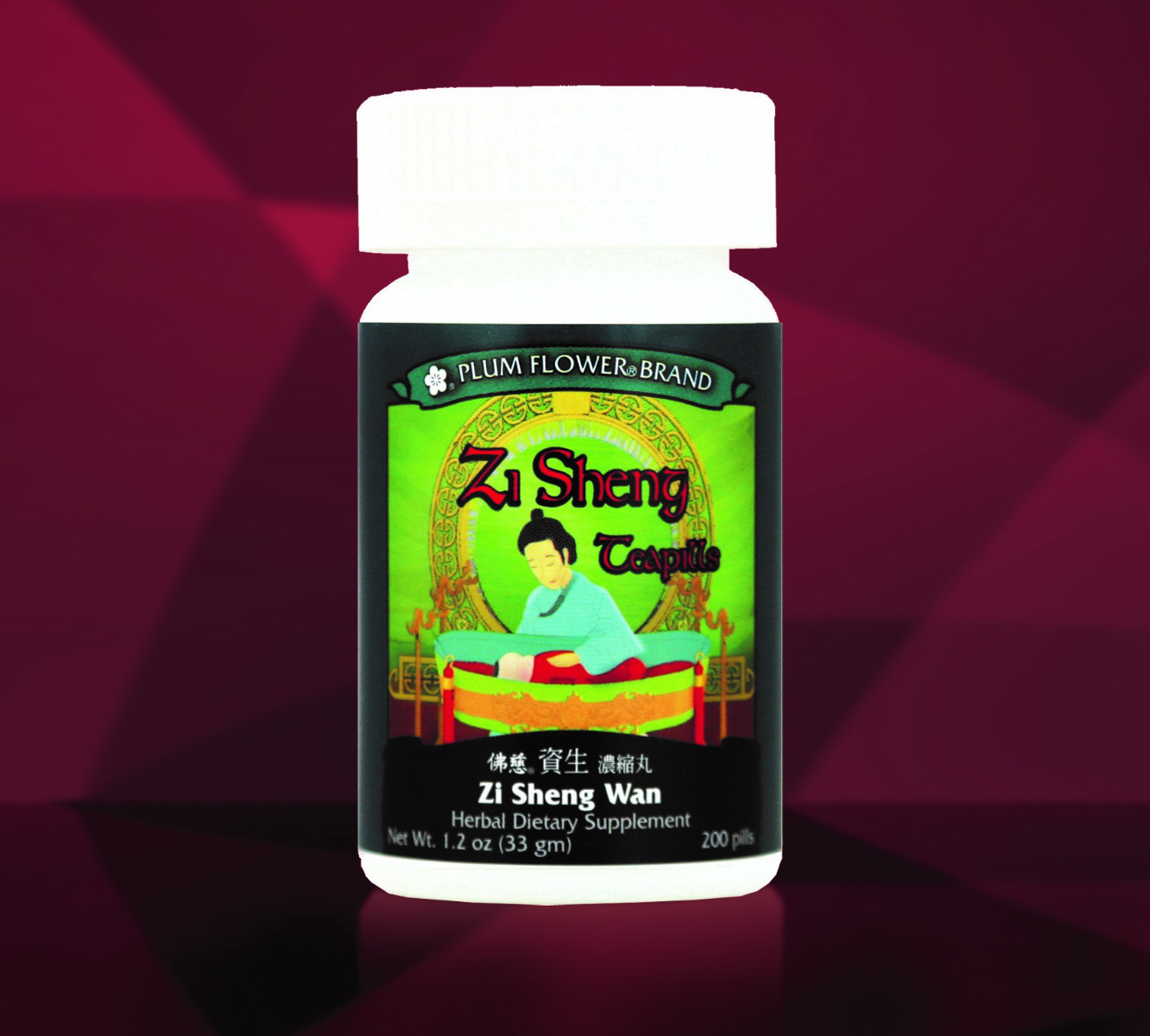Zi Sheng Wan/Nourish Life Pills for a mixed excess and deficiency pattern of digestive upset
 TCM Functions: Tonifies Spleen Qi, Regulates Qi in the Middle Jiao, Drains Dampness, Eliminates Food Stagnation, Harmonizes the Stomach, Clears Heat, Calms the Fetus.
TCM Functions: Tonifies Spleen Qi, Regulates Qi in the Middle Jiao, Drains Dampness, Eliminates Food Stagnation, Harmonizes the Stomach, Clears Heat, Calms the Fetus.
TCM Diagnosis: Spleen Qi deficiency with lingering dampness, food stagnation, and smoldering heat in the middle jiao. Also for mild summer damp-heat, or lingering damp-heat in the intestines.
Presentation: Occasional mild or episodic diarrhea, occasional fatigue, poor appetite, occasional nausea, epigastric and abdominal distention, bloating, indigestion, occasional acid regurgitation or heartburn, borborygmus, bad breath, foul smelling belching, malodorous gas and stools, loose, pasty or poorly formed stools, occasional diarrhea with undigested food in the stool. May be worse after meals and accompanied by weight loss, poor muscle tone, weakness and heaviness of the limbs, bruising easily, listlessness, poor concentration, pale complexion, low and soft voice.
Tongue: pale, thick white or yellow greasy coat
Pulse: weak, soft, slippery, wiry
Ingredients: Dang shen/Codonopsis pilosula root 11.7%, Bai zhu/Atractylodes macrocephala rhizome 11.7%, Yi yi ren/Coix lacryma jobi seed 11.7%, Shen qu/Massa fermenta 7.8%, Chen pi/Citrus reticulata peel 7.8%, Shan zha/Crataegus pinnatifida fruit 7.8%, Shan yao/Dioscorea opposita rhizome 5.9%, Qian shi/Euryale ferox seed 5.9%, Mai ya/Hordeum vulgare fruit 5.9%, Fu ling/Poria cocos fungus 5.9%, Bai bian dou/Dolichos lablab seed 3.9%, Lian zi/Nelumbo nucifera seed 3.9%, Jie geng/Platycodon grandiflorum root 2%, Huo xiang/Pogostemon cablin herb 2%, Gan cao/Glycyrrhiza uralensis root 2%, Ze xie/Alisma orientalis rhizome 1.4%, Bai dou kou/Amomum kravanh fruit 1.4%, Huang lian/Coptis chinensis rhizome 1.3%.
Dosage & Administration: The standard dosage is 8 pills, 3 x day. Administer half an hour before eating for optimal digestion & absorption, or in between meals with an empty stomach. In the initial phases, dosage may be increased to 8-12 pills 3 times per day, then reduced to a maintenance dose as the formula takes effect. May be used long-term for several weeks to several months. May be used over the course of several years.
Cautions & Contraindications: Contraindicated during the early stages of acute infection or illness, such as cold or flu. Contraindicated for acute gastroenteritis.
Clinical Comments: This classic formula was first published as Bao Tai Zi Sheng Wan, which translates to "Protect the Fetus and Nourish/Benefit Life Pills," in Xian Xing Zhai Yi Xue Guang Bi Ji/Extensive Notes on Medicine from the First-Awakened Studio published in 1613. Zi Sheng Wan “Nourish Life Pills” is a formula with a multi-targeted approach to strengthening digestion. It is an excellent formula to strengthen the Spleen's absorption and transportation of nutrients, for a mixed excess and deficiency pattern of Spleen Qi deficiency with dampness and chronic food stagnation.
The primary goal of the formula is to strengthen Spleen Qi and specifically the Spleen's ability to transform food and transport fluids, thus invigorating digestive function and increasing the absorption of nutrients. Secondarily it eliminates the blockage of food stagnation and dampness that has accumulated in the Stomach and Intestines due to the improperly digested food, and clears heat or damp-heat that may have been generated from the chronic stagnation. It is particularly helpful to increase the appetite, which can easily be lost by this combination of deficiency and excess. With the appropriate TCM diagnosis, it can be beneficial for occasional pediatric diarrhea, poor appetite and lack of vitality, as well as gentle support for pregnant women in the first trimester with morning sickness or a restless fetus.
Zi Sheng Wan can be seen as a modification of Shen Ling Bai Zhu Pian (many versions exist, but the most popular version was published around 990 A.D.), with the addition of herbs to increase the formula's action to eliminate dampness and firm the stools, as well as herbs to regulate Qi in the middle jiao, eliminate food stagnation and clear heat. This combination of Spleen Qi deficiency with dampness, food stagnation and heat may easily result in occasional mild or episodic loose stools or diarrhea.
In the modern clinic, Zi Sheng Wan is often used for mild summer damp-heat, or lingering damp-heat in the intestines, on a background of Spleen deficiency. These patients tend to have digestive symptoms occur when they are run down due to overworking or not sleeping well.
A bit more than a third of the formula is made up of a modified Si Jun Zi Tang - Dang shen, Bai zhu, Fu ling, and Gan cao, which combine to strongly tonify the Spleen, dry dampness and benefit digestion. Shan yao, Yi yi ren, Qian shi, and Ze xie increase the ability to tonify the Spleen and strongly drain dampness. Shen qu, Shan zha, and Mai ya are a great trio to eliminate food stagnation to improve the ability to digest incoming food. Mai ya aids the Si Jun Zi Tang base in directly improving the appetite. Shan yao, Bai bian dou, Lian zi, Qian shi, Shen qu and Shan zha combine to bind and firm up the stools. Huo xiang and Bai dou kou aromatically transform dampness and pierce through turbidity, and combine with Shen qu and Chen pi to promote Qi movement to alleviate distension. Jie geng aids in the regulation of the ascending and descending of Qi by promoting the upward movement of Qi as a counterpoint to the many downward moving herbs. Huo xiang clears summer damp, and treats summer damp-heat along with Bai Bian Dou and Huang lian. The small dose of Huang lian also works with Yi yi ren to clear damp-heat from the Spleen, Stomach and Intestines, to allow them to regain lost functionality without harming the Spleen Qi.
Combinations: For Qi rebelling upwards due to dampness or phlegm causing occasional nausea and vomiting, may be administered with Er Chen Wan. For Spleen Qi deficiency with food stagnation and more marked damp-heat during pregnancy, consider combining with Ban Xia Xie Xin San.
References:
- The Clinical Manual of Chinese Herbal Patent Medicines, 3rd Edition, by Will Maclean with Kathryn Taylor, Pangolin Press, 2016.
- Chinese Herbal Medicine - Formulas and Strategies, 2nd Edition, by Dan Bensky, Volker Scheid, Andy Ellis and Barolet, Eastland Press, 2009.
- Chinese Herbal Medicine – Materia Medica, 3nd Edition, by Dan Bensky, Steven Clavey and Erich Stoger, with Gamble, Eastland Press, 2004.
- Chinese Herbal Formulas and Applications - Pharmacological Effects & Clinical Research, by John Chen & Tina Chen, Art of Medicine Press, 2009.
- Chinese Medical Herbology and Pharmacology, by John Chen & Tina Chen, Art of Medicine Press, 2004.
- 160 Essential Chinese Herbal Patent Medicines, by Bob Flaws, Blue Poppy Press, 1999.
- Chinese Patent Medicines, A Beginner’s Guide, by Mark Taylor, Global Eyes International Press, 1998.


